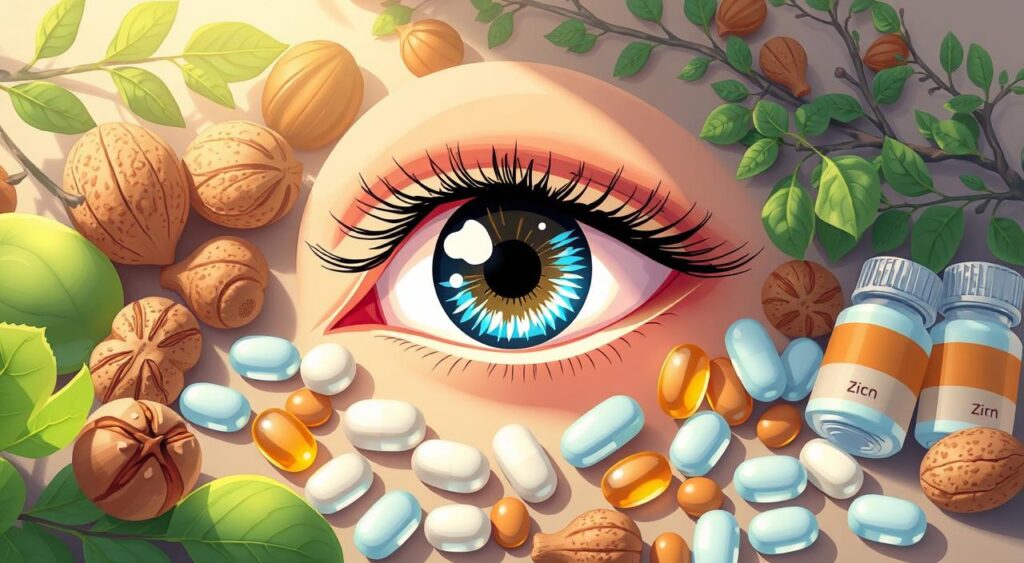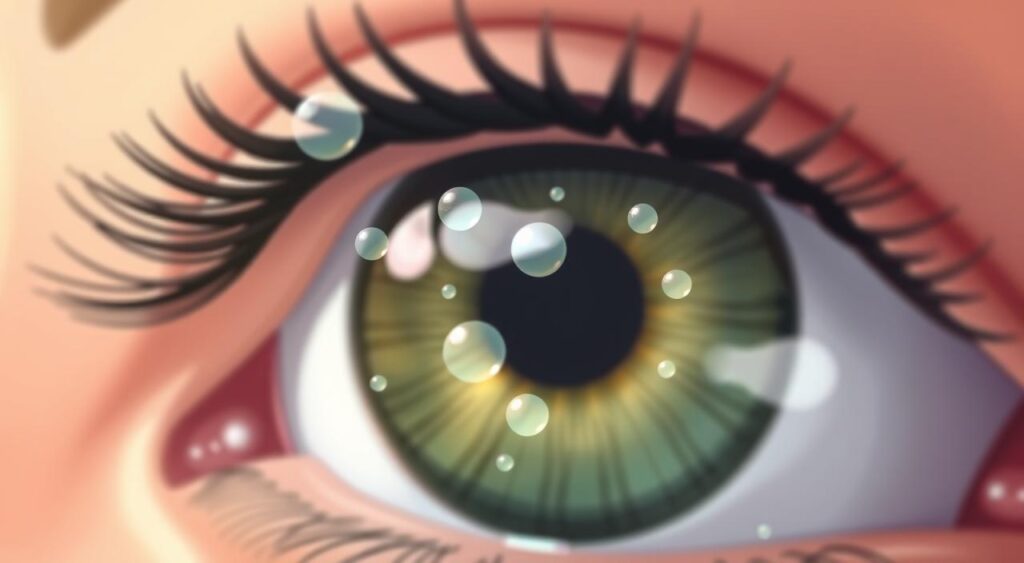If you’re one of the many dealing with vitamins for eye floaters , you’ll find relief with specific vitamins. These floaters are annoying specks that move in your vision. But, with the right vitamins and lifestyle changes, you can ease their impact.
Table of Contents
We’ll look at vitamins and nutrients that help eye health and lessen eye floaters. Vitamin C and Vitamin E are powerful for eye health. We’ll also cover Zinc, Lutein, and Omega-3 fatty acids. Learn how to add these to your daily routine. Say goodbye to eye floaters and enjoy clearer vision!
What are Eye Floaters?
Eye floaters are small, shadowy spots or specks that drift across your vision. They are common and often seen as people get older. These floaters happen when the vitreous humor, a gel-like substance in your eye, starts to break down.
Understanding the Causes and Symptoms
As we age, the vitreous can turn more liquid, causing floaters. These floaters are easy to see against a bright or plain background. They cast shadows that stand out more.
The main symptoms of eye floaters are:
- Seeing small, dark spots or specks in your vision that seem to drift or “float” across your field of view
- Experiencing a “cobweb” or “shadowy” effect in your vision
- Noticing the floaters more when looking at a bright or plain background
The causes of eye floaters include:
- The natural aging process, where the vitreous humor in the eye becomes more liquid over time
- Exposure to bright light or ultraviolet (UV) radiation, which can damage the vitreous
- Nearsightedness (myopia), which is associated with a higher risk of developing eye floaters
- Eye injury or inflammation, such as from a surgical procedure or eye infection
Eye floaters are usually harmless but can be annoying. They might signal an eye problem in some cases. See an eye doctor for a check-up if you see more floaters or your vision changes.
The Role of Vitamins in Eye Health
Keeping your eye healthy is vital for clear vision and fewer eye floaters. Vitamins and nutrients are crucial for the eyes’ structure and function. Adding these vitamins or supplements to your diet can boost your eye health and ease eye floaters.
The importance of vitamins for eyes is huge. These nutrients shield the eyes from harm, support vision health, and might lessen eye floaters. Let’s look at the main vitamins for eye health and their benefits.
Essential Vitamins for Eye Health
- Vitamin C – A strong antioxidant that guards the eyes against oxidative stress and may cut down eye floaters.
- Vitamin E – Crucial for protecting the eyes from free radical damage and supporting eye health.
- Zinc – Key for vision and eye function, keeping the retina and eye healthy.
- Lutein and Zeaxanthin – Carotenoids that filter out harmful blue light and shield the eyes from damage.
- Omega-3 Fatty Acids – Fight inflammation in the eyes and aid overall eye health and function.
Adding these vitamins for eye health to your diet or supplements lets you actively support your eye health. This might also help ease the annoyance of eye floaters.
| Vitamin | Benefits for Eye Health | Best Sources |
|---|---|---|
| Vitamin C | Benefits of Eye Health | Citrus fruits, bell peppers, strawberries |
| Vitamin E | Protection from oxidative stress, overall eye health | Nuts, seeds, leafy greens |
| Zinc | Proper vision and eye function, retinal health | Oysters, red meat, poultry, beans |
| Lutein and Zeaxanthin | Blue light filtration, eye protection | Leafy greens, corn, eggs |
| Omega-3 Fatty Acids | Reduced inflammation, overall eye health | Fatty fish, flaxseeds, walnuts |
Vitamin C: A Powerful Antioxidant for Eye Floaters
Vitamin C is a strong natural solution for eye floaters. It’s known for its antioxidant properties, which help support eye health and may reduce the size and density of floaters.
Best Sources of Vitamin C for Eye Health
Eating foods high in vitamin C is a great way to help your eyes. Some top sources include:
- Citrus fruits, such as oranges, lemons, and grapefruits
- Bell peppers, both red and green varieties
- Broccoli and other cruciferous vegetables
- Tomatoes, which are a great source of vitamin C and other eye-supportive nutrients
Enjoying these foods can help keep your eyes bright and robust.
Recommended Vitamin C Dosage for Eye Floaters
Adults need 75-90 milligrams of vitamin C daily. Some doctors suggest 100-200 milligrams a day for eye health and eye floaters. Always talk to your healthcare provider to find the right amount for you.
Adding foods high in vitamin C and, if advised, a supplement can help your eye health. This may reduce eye floaters.
Vitamins for Eye Floaters
Vitamin C is excellent for fighting off free radicals, but other vitamins can also help with eye floaters. Adding these essential nutrients to your diet can boost your eye health. This might also reduce the annoying floaters you see.
The Best Vitamins for Eye Floaters
Here are some top vitamins and nutrients for eye floaters:
- Vitamin E – This vitamin is an antioxidant that protects the eyes from damage. It helps prevent eye floaters.
- Vitamin A – Known as retinol, it’s key for healthy eyes and vision. It supports the retina and reduces inflammation.
- Zinc – This mineral is crucial for eye health and function. It helps use vitamin A effectively.
- Lutein and Zeaxanthin – These antioxidants protect the retina and lens from light damage.
- Omega-3 Fatty Acids – Omega-3s reduce eye inflammation. This might help lessen eye floaters.
Getting enough of these vitamins and nutrients can help lessen eye floaters, which means clearer and more comfortable vision.
Vitamin E: Protecting the Eyes from Oxidative Stress
Vitamin E is a strong ally against eye floaters. It helps protect the eyes from oxidative stress. This stress can cause eye floaters.
Vitamin E supports the vitreous humor, a clear jelly inside the eye. It shields this vital part from damage. This may lower the chance of eye floaters.
Good sources of vitamin E include:
- Nuts and seeds – Almonds, sunflower seeds, and hazelnuts are great for vitamin E.
- Vegetable oils – Oils like sunflower, safflower, and corn oil contain this nutrient.
- Leafy green vegetables – Spinach, kale, and Swiss chard have a good amount of vitamin E.
Eating these foods can support your eye health and help with eye floaters. A balanced diet is key for good eye function and overall health.
Zinc: Supporting Vision and Eye Function
Zinc is key for maintaining healthy vision and eye function. It helps make melanin, a pigment that shields your eyes from UV light damage. Zinc also fights inflammation and strengthens the vitreous humor, a clear substance in your eye.
Dietary Sources and Supplementation
There are many foods rich in zinc that support your eye health. Some top sources of zinc for eye floaters include:
- Red meat
- Poultry
- Seafood, such as oysters, crab, and lobster
- Legumes, like beans, lentils, and chickpeas
- Nuts and seeds
Supplements might be an option if you’re not getting enough zinc from your diet. But talk to your doctor before starting any supplements. They can guide you on the right dosage for your health.
| Food Source | Zinc Content (mg per serving) |
|---|---|
| Oysters, cooked, 3 oz | 74.0 |
| Beef, ground, 3 oz | 5.3 |
| Chicken, dark meat, 3 oz | 2.4 |
| Cashews, 1 oz | 1.6 |
| Chickpeas, cooked, 1 cup | 2.5 |
Eating zinc-rich foods or taking supplements can boost your vision and eye health. This might even reduce eye floaters and other vision problems.

Lutein and Zeaxanthin: Carotenoids for Eye Protection
Lutein and zeaxanthin are key carotenoids that help eye health. They are found in the macula, which is vital for sharp vision. These antioxidants protect the eyes from blue light and UV rays. This can help reduce eye floaters.
Eating foods high in lutein for eye floaters and zeaxanthin for eye floaters is good for your eyes. Leafy greens like kale, spinach, and collard greens are great options. Corn and egg yolks are also good choices.
- Lutein and zeaxanthin are concentrated in the macula, the central part of the retina.
- These carotenoids can help protect the eyes from harmful blue light and UV radiation.
- Foods rich in lutein and zeaxanthin include leafy greens, corn, and egg yolks.
Adding more lutein for eye floaters and zeaxanthin for eye floaters to your diet helps with eye health. It can also reduce eye floaters. A balanced diet is key for good vision and eye health.
Omega-3 Fatty Acids: Fighting Inflammation in the Eyes
If you have eye floaters, adding more omega-3 fatty acids to your diet could be a good move. These nutrients are known for fighting inflammation, which is good for your eyes. Inflammation can cause eye floaters, so omega-3s might help reduce them.
Best Sources of Omega-3s for Eye Health
Here are some top foods for omega-3 fatty acids and eye health:
- Fatty fish, such as salmon, tuna, and mackerel
- Flaxseeds and chia seeds
- Walnuts
These foods are full of omega-3s, especially EPA and DHA. Adding these best sources of omega-3 for eyes to your meals can boost your eye health. It might even cut down on eye floaters.
Recommended Dosage for Omega-3 Supplements
If eating enough omega-3s is difficult, consider taking a supplement. Aim for 1,000-2,000 mg daily, spread out over two or more doses. But talk to your doctor to find out what’s right for you.

Adding omega-3 fatty acids to your daily life can fight eye inflammation. This might help reduce eye floaters. Focus on eating the best sources of omega-3 for eyes for better eye health.
Incorporating Vitamins into Your Diet
Getting enough vitamins for eye floaters is easy by adding them to your daily meals. Focus on whole foods packed with vitamins and minerals that help eye health. These nutrients can also make eye floaters less noticeable.
Some top foods for foods with vitamins for eye floaters are:
- Citrus fruits like oranges, lemons, and grapefruits (high in vitamin C)
- Leafy green vegetables such as spinach, kale, and collard greens (high in lutein and zeaxanthin)
- Fatty fish like salmon, mackerel, and sardines (rich in omega-3 fatty acids)
- Nuts and seeds, including almonds, walnuts, and flaxseeds (good sources of vitamin E and zinc)
- Bell peppers, broccoli, and tomatoes (high in antioxidants like vitamin C)
If eating enough vitamins is difficult, consider taking an eye health supplement. These supplements are made to support eye health and lessen eye floaters.
| Vitamin | Role in Eye Health | Best Food Sources |
|---|---|---|
| Vitamin C | Powerful antioxidant that helps protect the eyes from oxidative stress | Citrus fruits, bell peppers, strawberries, broccoli |
| Vitamin E | Antioxidant that helps prevent damage to the eyes | Nuts, seeds, vegetable oils, leafy greens |
| Zinc | Supports vision and eye function | Oysters, red meat, poultry, beans, nuts |
| Lutein and Zeaxanthin | Carotenoids that protect the eyes from harmful blue light | Leafy greens, corn, eggs, orange peppers |
| Omega-3 Fatty Acids | Reduce inflammation and support overall eye health | Fatty fish, walnuts, flaxseeds |
Adding these vitamins and nutrients to your diet can help support your eye health and reduce the appearance of eye floaters.
Lifestyle Changes to Complement Vitamin Intake
Adding key vitamins and nutrients to your diet is essential. But making lifestyle changes can also help reduce eye floaters. By eating well and living healthily, you can better manage eye floaters and keep your eyes healthy.
Here are some lifestyle tips for eye floaters that go well with vitamin intake:
- Maintain Good Posture—Sitting or standing poorly can strain your eyes and worsen floaters. Be aware of how you sit, especially when on screens, and stretch your eyes often.
- Reduce Screen Time – Too much blue light from screens can tire your eyes and make floaters more noticeable. Cut down on screen time and remember the 20-20-20 rule: look at something 20 feet away for 20 seconds every 20 minutes.
- Stay Hydrated – Not drinking enough water can strain your eyes and cause floaters. Drink plenty of water all day to keep your eyes moist and healthy.
- Protect Your Eyes from UV Exposure—UV rays can hurt your eyes and cause floaters. Always wear sunglasses or a hat with a wide brim outside to protect your eyes from UV rays.
Adding these lifestyle tips for eye floaters to your daily life can help you manage and reduce their impact. These tips, along with taking vitamins, make a strong plan for eye health.

When to Seek Professional Help
If you have eye floaters, trying supplements and making lifestyle changes might help. But sometimes, you need to see a doctor. This is true if you see more or bigger floaters, flashes of light, or your side vision goes away.
Seeing an eye doctor is a good idea. They can check what’s causing your floaters and see if you need treatment. Sometimes, floaters could mean a serious issue like a tear or detachment in your retina. These need quick medical care.
Getting help from a professional means your eyes will get a complete check-up. They can fix any problems early on, which can clear up your floaters and prevent other vision problems. If you see big changes in your eyes or vision, don’t wait. Early treatment can help.
FAQ
What are eye floaters?
Eye floaters are small, shadowy spots or specks that move in your vision. They happen when the vitreous humor inside your eye gets old and changes.
How do vitamins support eye health?
Vitamins and nutrients are essential for eye health. They help keep your eyes working right. Adding these vitamins to your diet or supplements can improve eye health and help with eye floaters.
How can vitamin C help with eye floaters?
Vitamin C fights off eye damage with its antioxidant power. Keeping the vitreous humor healthy can make eye floaters smaller and less dense.
What other vitamins are beneficial for eye floaters?
Besides vitamin C, vitamins E and A, zinc, lutein, and zeaxanthin help with eye floaters. Taking these vitamins daily can lessen eye floaters and boost eye health.
How does vitamin E protect the eyes from oxidative stress?
Vitamin E is an antioxidant that shields the eyes from oxidative stress damage. It helps keep the vitreous humor strong, which may reduce eye floaters.
How does zinc support vision and eye function?
Zinc is vital for healthy vision and eye function. It makes melanin, a pigment that protects eyes from UV damage. Zinc also fights inflammation and keeps the vitreous humor strong.
What are the benefits of lutein and zeaxanthin for eye health?
Lutein and zeaxanthin are in the macula, which is key for sharp vision. They protect the eyes from blue light and UV, which may stop eye floaters.
How can omega-3 fatty acids help with eye floaters?
Omega-3s fight inflammation, which is good for eye health. Inflammation can cause eye floaters, so having omega-3s in your diet may reduce them.
How can I incorporate vitamins into my diet to support eye health?
Eat foods rich in vitamins for eye health, such as fruits, veggies, nuts, seeds, and fatty fish. If diet alone isn’t enough, consider supplements.
What lifestyle changes can complement vitamin intake for managing eye floaters?
Besides vitamins, lifestyle changes help with eye floaters. Keep good posture, limit screen time, drink plenty of water, and protect your eyes from UV light.
When should I seek professional help for eye floaters?
See a doctor if eye floaters get worse, you see flashes of light or lose side vision. They can check for serious issues that need treatment.
